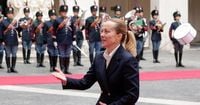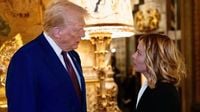Italian Prime Minister Giorgia Meloni arrived in Washington on April 17, 2025, for a pivotal bilateral meeting with U.S. President Donald Trump, marking her as the first European leader to engage with him since he announced a series of controversial tariffs on European imports. This meeting comes amid a tense trade standoff between the United States and the European Union (EU), raising hopes for a potential resolution while also stirring concerns over the implications for European unity.
Meloni's visit to the White House is seen as a significant test of her diplomatic skills and her ability to navigate the complexities of U.S.-EU relations. "It's a difficult moment," Meloni acknowledged, reflecting on the high stakes involved in her discussions with Trump. "We'll do our best – let's see how it goes." Her rapport with Trump, which has been described as akin to that of a "Trump whisperer," will be crucial as they address a range of sensitive issues, including tariffs, defense spending, and the ongoing conflict in Ukraine.
In early April, Trump announced a 20% "reciprocal" tariff on all imported goods from the EU, a move that he later reduced to 10% for a 90-day negotiation period. The EU responded by pausing its own retaliatory tariffs, which targeted approximately €21 billion ($23.8 billion) worth of U.S. exports. European Commission President Ursula von der Leyen emphasized the importance of negotiations, stating, "We want to give negotiations a chance," but warned that if talks do not yield satisfactory results, EU countermeasures would be implemented.
Meloni's previous meeting with Trump at his Mar-a-Lago estate in January 2025 had set a positive tone, with Trump praising her as a "fantastic woman" taking Europe by storm. However, the stakes are higher now, as she aims to represent not only Italy's interests but also those of the broader EU. Analysts suggest that while Meloni has a personal connection with Trump, she must ensure that her actions do not undermine European solidarity.
"One of the major challenges of this visit will be demonstrating that Meloni is acting as a mediator on behalf of the entire EU, not just in defense of Italian interests," noted Wolfango Piccoli, co-president at risk consultancy Teneo. Italy, as the euro zone's third-largest economy, has much to gain from a favorable trade agreement with the U.S., particularly in sectors such as machinery, medical products, and food exports, which are vital to its economy.
Italy recorded a trade surplus of $43.9 billion with the U.S. in 2024, and Meloni has expressed concern that Trump's tariffs could negatively impact Italian exports, particularly in the agri-food sector. "The tariffs are wrong and not in the interest of either party," she stated, urging her European counterparts to work towards averting a trade war that could weaken the West in favor of other global players.
In addition to tariffs, Meloni is expected to discuss NATO defense spending targets, with Trump insisting that member states increase their military expenditures to 2% of GDP. Italy's current spending is at 1.49%, among the lowest in Europe, which could complicate Meloni's position as she navigates U.S. expectations while maintaining her commitments to the EU.
As Meloni prepares for her meetings, she is also set to host U.S. Vice President J.D. Vance in Rome on April 18, adding another layer to her diplomatic efforts. The Italian government has emphasized that Meloni's agenda aligns closely with Brussels, with frequent communications between her office and EU leaders ahead of the trip.
However, there are concerns that Meloni's close ties with Trump could lead to a divergence from EU positions, particularly regarding trade relations with China. Analysts suggest that Trump may attempt to leverage Meloni's relationship to gain concessions from the EU, potentially complicating the bloc's unified stance.
"It is likely that Trump will try to tempt Meloni, to divide Europe," warned Cinzia Alcidi, a senior research fellow at the Centre for European Policy Studies. The potential for Trump to offer tariff concessions in exchange for a tougher EU stance on China further complicates Meloni's role as she seeks to balance national interests with her commitments to European unity.
Despite the challenges, Meloni's supporters view this meeting as an opportunity to strengthen Italy's position within the EU and enhance its diplomatic capital. Her ability to effectively communicate Italy's priorities while maintaining a cohesive European front will be closely scrutinized.
As Meloni embarks on this critical diplomatic mission, the outcome of her discussions with Trump could have significant implications for both Italy and the EU. The trade relationship between the U.S. and Europe is the most important in the world, with annual trade reaching €1.6 trillion ($1.8 trillion). Navigating this relationship successfully is essential for maintaining economic stability and fostering cooperation amid global uncertainties.
In summary, Meloni's visit to Washington represents a delicate balancing act as she seeks to advance Italy's interests while upholding the collective goals of the European Union. With the world watching, her performance in these negotiations will likely shape perceptions of her leadership both at home and abroad.







